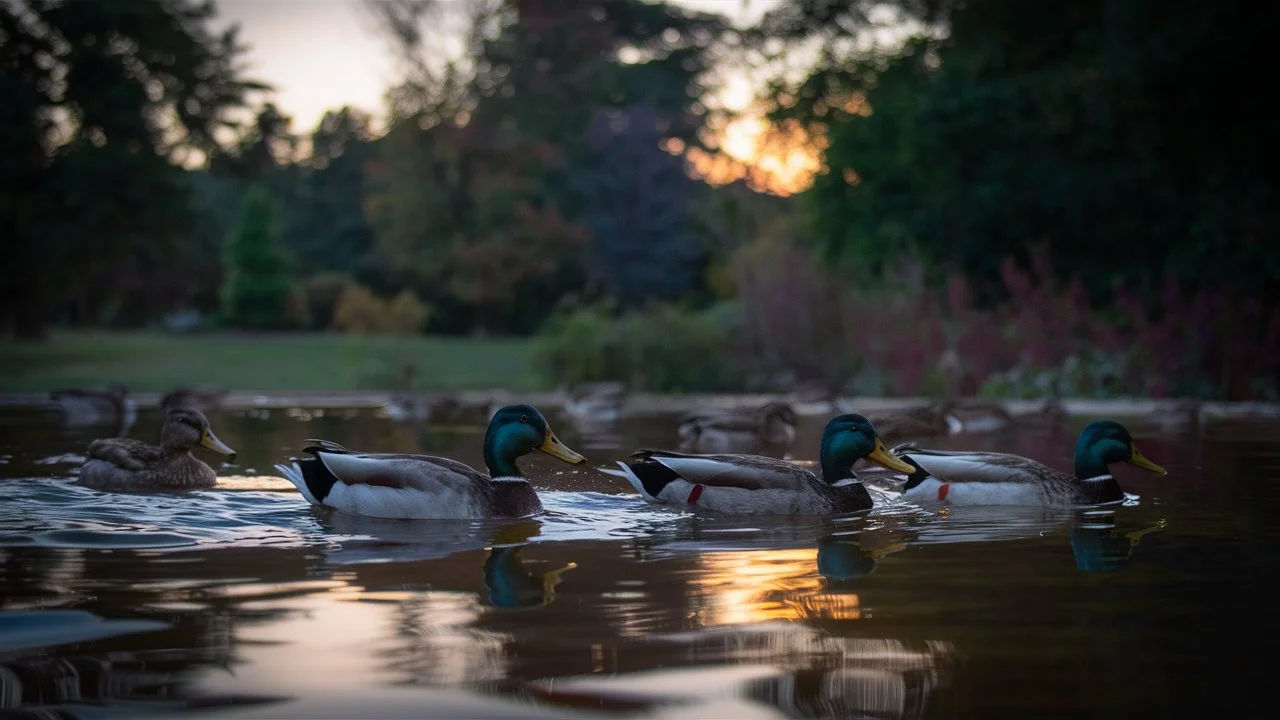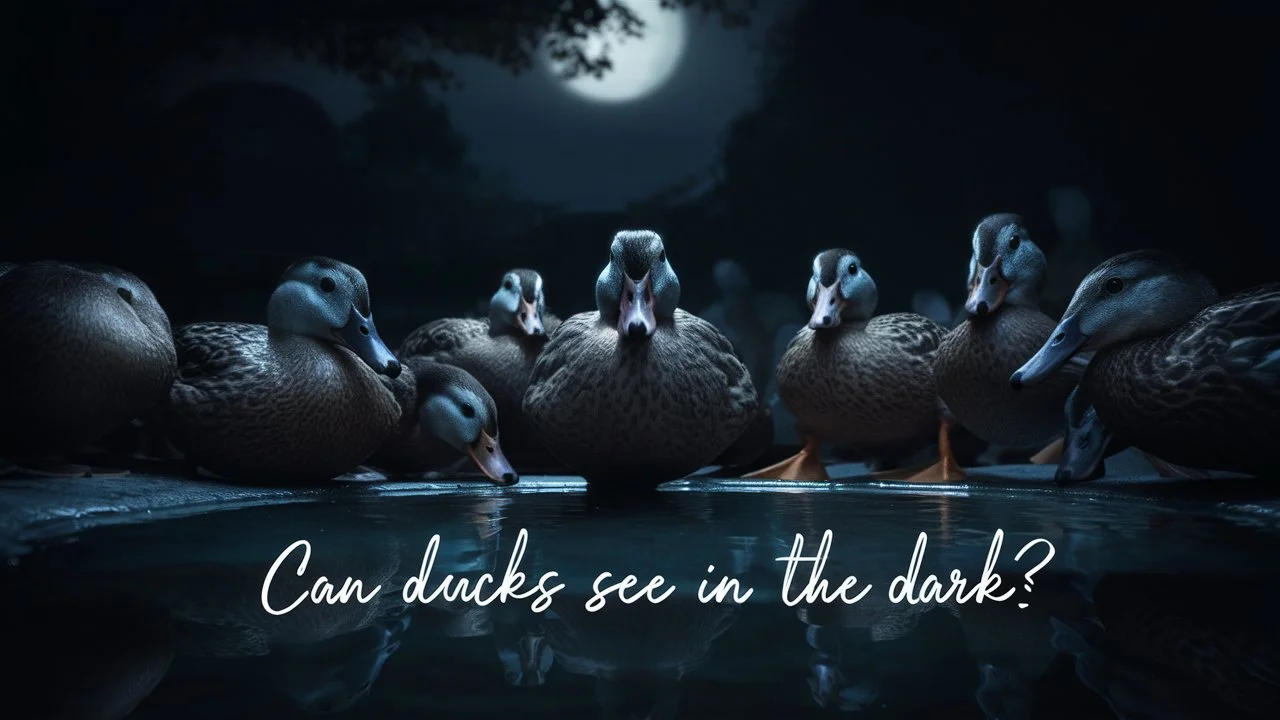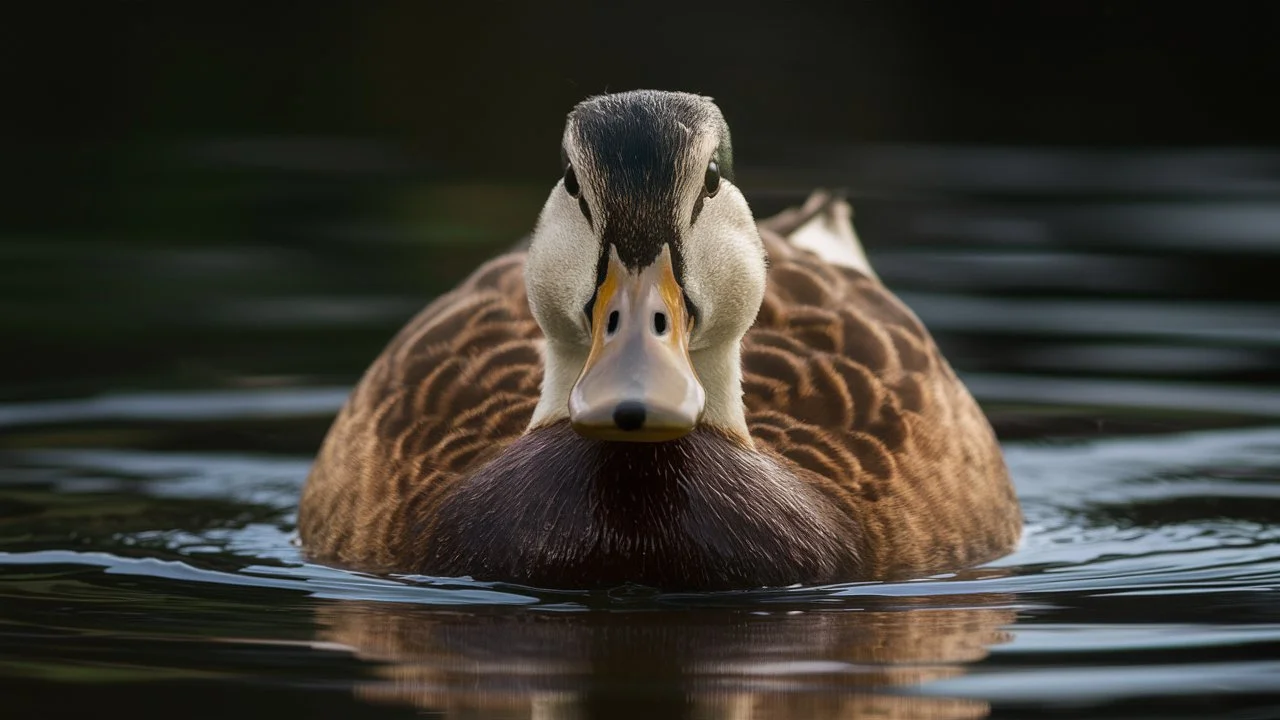Ducks are amazing birds with special eyes that help them see in low light. Have you ever wondered if ducks can see in the dark? In this article, we will explore how ducks use their unique vision to see better than humans when the light is dim. Let’s dive in and learn more about how ducks see at night.
Ducks cannot see in complete darkness but they can see very well in low light. Their eyes have special features that help them see better than humans at dawn, dusk, and nighttime. So, while they don’t have perfect night vision, they are much better at seeing in dim light than we are.
Can Ducks See in the Dark?
Ducks have special eyes that help them see well in low light. While they cannot see in complete darkness, they can see better than humans in dim light. Here’s why:

1. Eye Structure
Ducks have a large number of rods in their eyes. Rods are cells that help with vision in low light. More rods mean better night vision.
2. Tapetum Lucidum
Many ducks have a special layer in their eyes called the tapetum lucidum. This layer reflects light back through the retina, making the light more useful for seeing in the dark. It works like a mirror, giving ducks a second chance to see the light.
3. Adaptation
Ducks are crepuscular, meaning they are most active at dawn and dusk. This lifestyle has helped their eyes adapt to low-light conditions. They can see well during these times, even when the light is not very bright.
4. Movement Detection
Ducks are good at detecting movement in the dark. Their eyes are adapted to spot predators and other dangers, even when there isn’t much light.
Can Ducks See at Night?
Ducks are amazing creatures with special vision. Let’s find out how well ducks can see at night!
Special Eyes for Low Light
Ducks have eyes that are built to see in low light. They have more rods in their eyes than humans. Rods are cells that help see in dim light. This makes ducks good at seeing when it’s not very bright.
Better Than Humans
Ducks can see better than humans at night, but they cannot see in complete darkness. Their eyes are adapted to work well in low light, like during dawn and dusk.
The Tapetum Lucidum
Many ducks have a special layer in their eyes called the tapetum lucidum. This layer acts like a mirror and helps reflect light inside their eyes. It gives ducks a second chance to use the light, making it easier for them to see in the dark.
Active at Dawn and Dusk
Ducks are often active at dawn and dusk. Their eyes are adapted to these times of day when there is some light but not a lot. This adaptation helps them find food and stay safe from predators.
Do Ducks Need Light at Night?
Ducks, like many other animals, have unique adaptations that help them survive and thrive in their natural environments. Understanding whether ducks need light at night involves exploring their behavior, vision capabilities, and natural habitat.
Night Vision Capabilities
Ducks have good night vision due to the large number of rod cells in their eyes, which are specialized for seeing in low light. Additionally, many ducks possess a special layer in their eyes called the tapetum lucidum, which reflects light and enhances their ability to see in dim conditions. This means that while ducks cannot see in complete darkness, they can navigate and find food in low-light situations better than humans.
Natural Behavior
Ducks are crepuscular animals, meaning they are most active during the early morning and late evening. However, many ducks are also active during the night, especially when looking for food or avoiding predators. Their ability to see well in low light helps them during these times.
Sleeping Habits
At night, ducks typically find a safe place to sleep. They often rest in groups for protection and choose locations that are secure from predators. While they do not need light to sleep, having a little ambient light can help them stay alert to potential dangers. Their keen sense of hearing also plays a crucial role in detecting threats at night.
Artificial Light
In human-made environments, such as farms or urban areas, ducks might encounter artificial light. While ducks do not require artificial light to survive at night, moderate lighting can sometimes help them feel safer and make it easier for them to navigate. However, excessive artificial light can disrupt their natural behavior and sleep patterns.
Can Ducks See in the Dark During the Day?
Ducks have unique vision capabilities that allow them to see well in low light, but what about during the day? Let’s explore how their vision works in different lighting conditions.
Special Eyes for All Light Conditions
Ducks have eyes that are adapted to see in various light conditions. While they are particularly good at seeing in low light, such as dawn, dusk, and cloudy days, their vision is also effective during the day.
Low Light Adaptations
Ducks have a high number of rod cells in their eyes. Rod cells help animals see in low light. This is why ducks can see well when it’s dim or dark. However, during the day when it is bright, they rely more on cone cells, which are responsible for color vision and work best in bright light.
Vision During the Day
During the day, ducks do not need their low-light adaptations as much. The abundant daylight provides more than enough light for their cone cells to function optimally. Ducks can see colors and details clearly in bright light, just like humans. Their ability to see in low light does not affect their daytime vision negatively.
Contrast and Movement Detection
Even in bright daylight, ducks benefit from their excellent motion detection abilities. Their eyes are good at spotting movement, which helps them find food and stay alert to potential dangers. This capability is beneficial in both low light and bright light conditions.
How Do Ducks See Color?
Ducks have unique vision capabilities that allow them to see colors in a different way than humans. Let’s explore how ducks perceive colors and how their vision works.
Color Vision in Ducks
Ducks have special cells in their eyes called cone cells. These cells are responsible for detecting color. While humans have three types of cone cells (trichromatic vision), ducks have four types (tetrachromatic vision). This means ducks can see a wider range of colors than humans.
Types of Cone Cells
- Red Cone Cells: Detect red wavelengths.
- Green Cone Cells: Detect green wavelengths.
- Blue Cone Cells: Detect blue wavelengths.
- Ultraviolet (UV) Cone Cells: Detect UV light, which is invisible to humans.
Seeing Ultraviolet Light
One of the most fascinating aspects of duck vision is their ability to see ultraviolet light. UV light is beyond the visible spectrum for humans, but ducks can see it. This ability helps them in various ways, such as finding food, choosing mates, and navigating their environment.
Enhanced Color Perception
Because ducks have four types of cone cells, their color perception is more vibrant and diverse than that of humans. They can see more shades and combinations of colors, making their world appear much richer in hues. This enhanced color vision is particularly useful for:
- Identifying Food: Different types of food can reflect UV light differently, making it easier for ducks to spot them.
- Mate Selection: Many birds, including ducks, have plumage that reflects UV light, which can be a factor in attracting mates.
- Environmental Awareness: The ability to see a broader spectrum of light helps ducks navigate their surroundings more effectively.
Comparison with Human Vision
While humans rely on red, green, and blue cone cells to see the world in color, ducks’ additional UV cone cells give them an edge in detecting nuances that we cannot see. For instance, what might look like a plain feather to us can have intricate patterns visible only in UV light to ducks.
Conclusion:
Ducks have special eyes that help them see well in low light. They cannot see in complete darkness, but they can see better than humans when it is dim. Their eyes have more rod cells and a special layer called the tapetum lucidum, which reflects light and improves their night vision. Ducks are active at dawn and dusk, and their vision helps them find food and stay safe from predators during these times. So, while ducks do not see perfectly in the dark, they have excellent vision in low-light conditions, making them well-suited to their environments.


